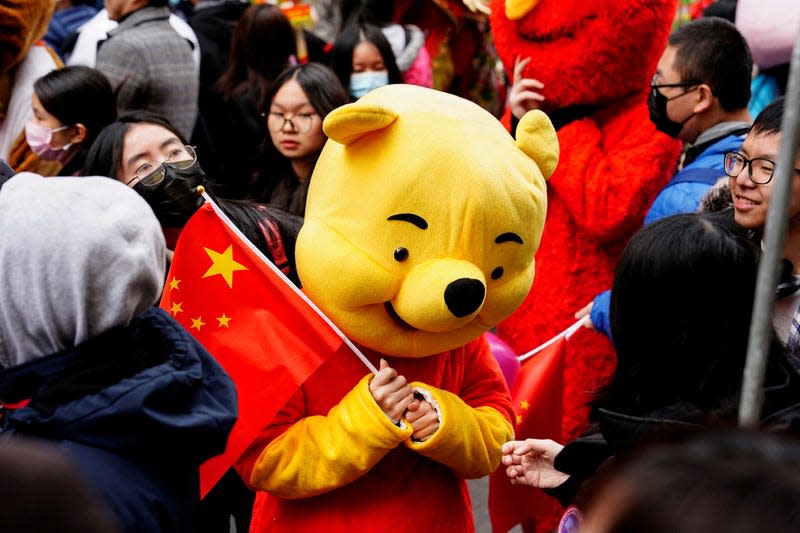Chinese censors are still not over the Winnie the Pooh meme of leader Xi Jinping

- Oops!Something went wrong.Please try again later.
Oh, bother.
Hong Kongers won’t get the chance to watch Winnie the Pooh go feral on the big screen.
The March 23 release of British slasher film, Winnie the Pooh: Blood and Honey, has been canceled in Hong Kong, according to a statement by distributor VII Pillars Entertainment posted to its Facebook page. No reason was cited for pulling the film.
Read more
The cartoon character’s unlikely rise to protest symbol against China’s leadership may have had something to do with the ban. Winnie the Pooh has been a flashpoint for censorship in China since 2013, when memes comparing the bear to president Xi Jinping first went viral. In 2018, China banned the film Christopher Robin, an adaptation of A.A. Milne’s storybooks featuring Winnie the Pooh.
Despite Chinese censors’ efforts, the meme has proven a lasting symbol of dissent and resistance. Hong Kong protestors wore Winnie the Pooh masks during the 2019 pro-democracy demonstrations to mock Xi Jinping, while the image featured in China’s protests against its stringent zero-covid policy. Even Japan’s Disney store ended up selling merch with an image of Winnie the Pooh during the recent wave of protests in China against the government.
The circulation of Winnie the Pooh imagery has at least one documented case of landing a Chinese citizen in prison. Luo Daiqing, a student studying abroad at the University of Minnesota in 2019, was sentenced to six months behind bars upon his return home after retweeting an image of Xi Jinping’s face superimposed on Winnie the Pooh’s body.
有人把小米之家展示的手機桌面全換成這個,我快笑死😆 pic.twitter.com/M0bu1dmU32
— 即物哀觀 (@lunkertw) April 16, 2019
What is film censorship like in Hong Kong?
Censorship in Hong Kong, a special administrative region of China, has ramped up since the passage of a National Security Law on June 30, 2020. The law covers Hong Kong and its global diaspora and criminalizes four broadly defined activities which include secession, subversion of state power, terrorism, and foreign collusion.
Then in 2021, Hong Kong passed censorship law to ban movies that “endorse, support, glorify, encourage and incite activities that might endanger national security.” Last year, two films were pulled from a Hong Kong international film festival, including Taiwanese film Islander, and Hong Kong film Time, and Time again, after failing to get an approval certificate from authorities.
Article 25 in China’s 2002 Film and Administration Regulation bans the depiction of content that “propagates evil cults or superstition.” The policy has been used to censor a range of films in China, including ghost and horror movies.
Related stories
🛑 China wants people to stop comparing its president to Winnie the Pooh
🎥 A movie about the dangers of Communist control brought Hong Kong residents out in droves
🎞️ Six films to watch to understand what’s happening in Hong Kong
More from Quartz
The US will pilot a program to renew H-1B visas domestically
More than half of US nursing homes are unprofitable—and it's about to get a lot worse
Sign up for Quartz's Newsletter. For the latest news, Facebook, Twitter and Instagram.
